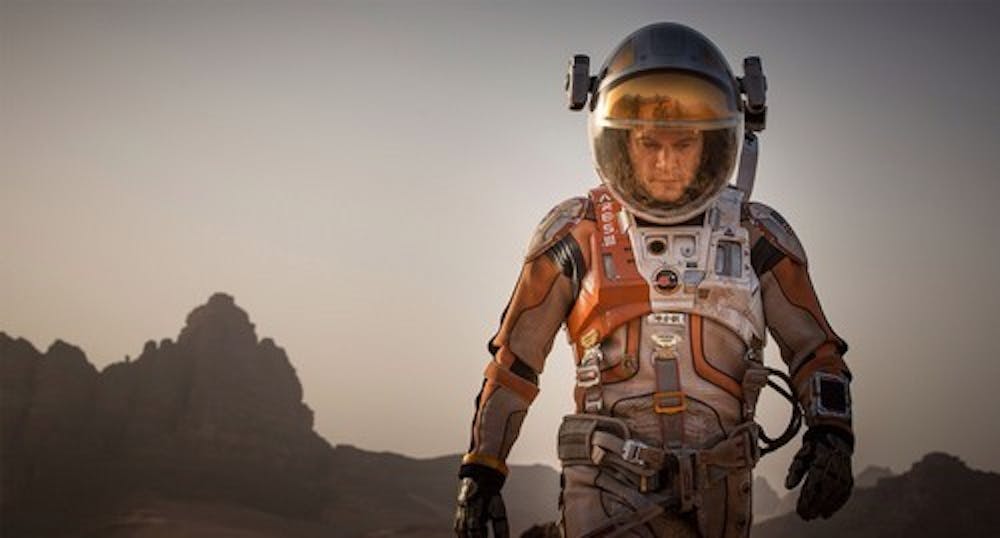
Paraphrased, the post said that between films like Saving Private Ryan and now The Martian, the United States government has theoretically spent an enormous amount of resources just to get this guy back home. This Internet meme’s analysis really does seem to hold true: Matt Damon’s characters’ need to be rescued is becoming so consistent that it rivals the likelihood that any character played by actor Sean Bean (Game of Thrones, Lord of the Rings) will die in any given appearance.
Following last year’s Interstellar, The Martian now marks the second time Damon has been abandoned and forgotten in space.
But jokes aside, comparing The Martian to Interstellar wouldn’t be entirely accurate. Indeed director Ridley Scott’s recent space-survival film (based on Andy Weir’s novel of the same name) has more elements in common with 2013’s Gravity than anything else: A lone character fights to survive in the depths of space with his odds of survival dwindling by the minute.
Comparisons between these various space films will be inevitable. But how does Scott’s film manage to stack up?
The Martian tells the story of one Mark Watney, a NASA astronaut aboard a manned mission to Mars. After the expedition faces an intense storm, much of the crew abandons the planet to return safely to Earth. The main issue? Watney gets left behind. With no means of communication, he has no choice but to sit and wait, hoping for potential rescue. In an attempt to survive, he journeys to an artificial habitat that his crew had been constructing and plans to grow enough food to holdout until someone eventually returns for him, which could take as long as three years.
However the environment on Mars proves not at all hospitable, and getting back home is not quite as easy as Watney planned.
From this plot description, The Martian comes across as a sort of scientific survival drama. In fact this original impression is what makes it so easy to compare the film to Gravity. The Martian’s focus on Watney’s struggle to survive on the alien planet evokes a sort of “man versus nature” feeling that many films within the space-travel genre aim to capture. That said, the film does not limit itself simply to these conventions.
Unlike Gravity, which relied intensely on its cramped, compressed settings and the vastness of space to produce feelings of claustrophobia and isolation, The Martian takes the opposite approach.
From the film’s sweeping shots of martian landscape to the abandoned machines and structure and the many struggles Watney faces on his survivalist journey, there is no question that the character is utterly alone.

However those same sweeping shots of the landscape and the intricate settings produce a different sense of isolation intermingled with a sense of abandonment.
It is impossible to shake the sense of tragedy. Audiences must grapple with the fact that this is a man who was left behind. And Damon does an exemplary job of bringing these complex feelings to the forefront, deftly allowing us to see a character struggling to hold on to hope in a situation that is quite simply hopeless.
What’s more, the film juxtaposes Watney’s scenes on Mars against those on Earth, where the more urgent struggle takes place. The utter pandemonium of everything on Earth adds a touch of fast-paced urgency to the slower, more methodical desperation of Watney’s survival itself. Exemplary performances from the cast (including Jessica Chastain, Jeff Daniels and Sean Bean) allow every moment of the film to drive closer and closer to the edge of desperation.
Desperation is truly the name of the game in The Martian. Atmospherically it never lets up and never allows the viewer to question the severity of the situation at hand. It’s a constant cycle of buildup and knockdown with the best laid plans of the characters being constantly shattered.
Rather than being depressing or mean-spirited, the viewer is always questioning, “What will they do now?”
As a whole films like this always come under some scrutiny for their relative level of scientific accuracy. Yes, the film does take some liberties here and there that frankly aren’t particularly difficult to notice even for an audience unfamiliar with the precisions of space travel. While these issues can be a little bit jarring in places, I do not believe they detract from the inherent quality of the film.
This is a movie that thrives on desperation and atmosphere, and those elements are present in spades. If viewers can bring themselves to look past these slight scientific issues, there is a lot here to enjoy.
In conclusion The Martian succeeds as a film absolutely beautifully. Crafting an intense atmosphere that never feels heavy handed, the film is able to easily rope in viewers’ attention and never let it go. Its visuals are equal parts stunning and terrifying, and its structure leaves audiences hungry for more.
Once again we must cycle back to poor Damon, a man so often abandoned. Damon, unfortunately, so long as the stories of your rescue keep being this good, you’re inevitably going to keep getting left behind. But don’t worry. We’ll come back for you. We need you for the next movie.
Overall rating: 9/10





